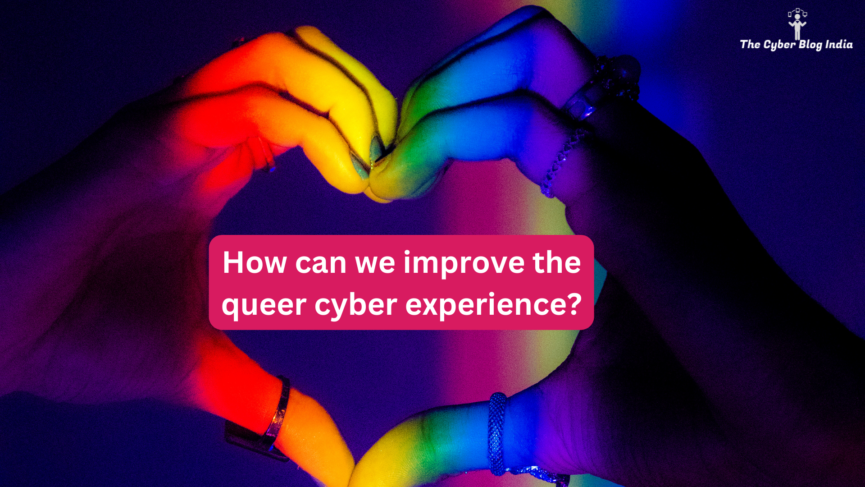How can we improve the queer cyber experience?

In April 2022, we organised our first online conference on “Abuse and Harassment in the Cyber Space: Beyond the Perceptions of Main Stream.” This conference included 12 Instagram Live sessions, and two panel discussions broadcasted live on YouTube. Since then, it has been a long time, but we have strapped on our boots again and are ready to go. Our conference saw two panels of six members, each from different spheres of life with varied experiences. These panel discussions had one common theme: panel members had the courage and bravery to accept their truth and advocate for an inclusive and non-discriminatory society.
We will publish a series of articles in these few weeks. These articles convey the outcomes of major talking points discussed in the panel discussions. They cover the thoughts of our esteemed panellists, opinions, newspaper articles, and relevant research. Through this research, we seek to present an understanding of various issues faced by the queer community. Alongside this, we hope to suggest possible recommendations and interventions by different stakeholders to create an inclusive environment for the community.
The Cyber Blog India welcomes any queries and recommendations from our readers and fellow stakeholders.
Introduction
So far, we have discussed issues pertaining to the queer community online and offline. Now, the question is, what should we do to create a better tomorrow for everyone? We have shared some suggestions for specific issues pointed out by our panellists in earlier articles. There are multiple stakeholders and forces in play when we talk about queer issues. They include the members of the community, the general public, the police force, NGOs, online platforms and the government. While we have already discussed online platforms, media, and police, we focus on other stakeholders in this article. This article complements earlier recommendations and builds on those.
Role of NGOs
Plenty of NGOs work diligently to protect the LGBTQIA+ community’s well-being. The members of these NGOs come from various walks of life and have varying experiences that help them understand and assist with multifarious issues. NGOs such as Humsafar Trust and Naz Foundation. They assist queer individuals in finding accommodation, file police complaints, and make constant efforts to spread awareness amongst the masses. Hence, these organisations play an essential role in providing a safer environment for the community.
NGOs have also taken steps to bring about equal rights for everyone in Indian legal jurisprudence. Naz Foundation’s petition before the Delhi High Court, challenging Section 377 of the Indian Penal Code, 1860, is one example. Various organisations have contributed to and continued the legal battle for not only discrimination against homosexual intercourse but also for legal recognition of same-sex marriages.
Patruni, one of our panellists, shared an incident when they took the help of an NGO to report a blackmail incident through a queer dating app. NGOs have helped many individuals like Patruni wade through the waters of the police and the judiciary. Manak, another panellist and an executive director at the YP Foundation, elaborated on his organisation’s work in aiding multiple queer people with issues related to law, society, awareness, and judiciary.
Furthermore, NGOs are a significant force in spreading awareness within the community and among other stakeholders. They undertake various initiatives such as workshops, pride parades, fests, etc. They also create and foster a community where people can feel safe and comfortable.
Spreading Awareness
Awareness is not only necessary for non-queer individuals but also for the members of the community. Society needs to be conscious of its actions, and queer individuals should know their resources in case of a crisis. Regarding awareness in the general public, several areas are worth mentioning.
First, individuals should have a basic understanding of LGBTQIA+. This can help them let go of their individual biases.
Second, the public at large must recognise the struggles faced by queer individuals in the past as well as the present.
Third, people must evaluate their actions and see if they have ever been detrimental to community members.
Fourth, they can aid other awareness programmes and help spread the word.
There are many things community members should know. First, community members must understand their grievance redressal mechanisms in case anything inappropriate happens, online or offline. Mechanisms include filing a police complaint, reporting an account to the platform, etc. Knowing the proper procedure and the points of contact for redressal is crucial.
Basic legal awareness will help the queer community fight against injustice on a first-hand level. We have seen many instances where society at large or law enforcement agencies have tried to intimidate, extort, or unlawfully detain queer individuals.
Can we achieve this?
Lawmakers have an integral role to play by drafting and implementing statutes that provide equal rights to everyone. Upcoming regulations and guidelines must provide for simpler and easy-to-access grievance redressal mechanisms. While preparing any law or implementing a policy, the government should ensure that the intended beneficiaries of these developments must be consulted. Optimistic regulatory developments will instil a sense of confidence among the members of the queer community. While workshops and online campaigns will undoubtedly help, our panellists believe that education regarding homosexuality should be imparted right from primary school. This will help future generations have a better acceptance and understanding of genders and sexualities than we do.
